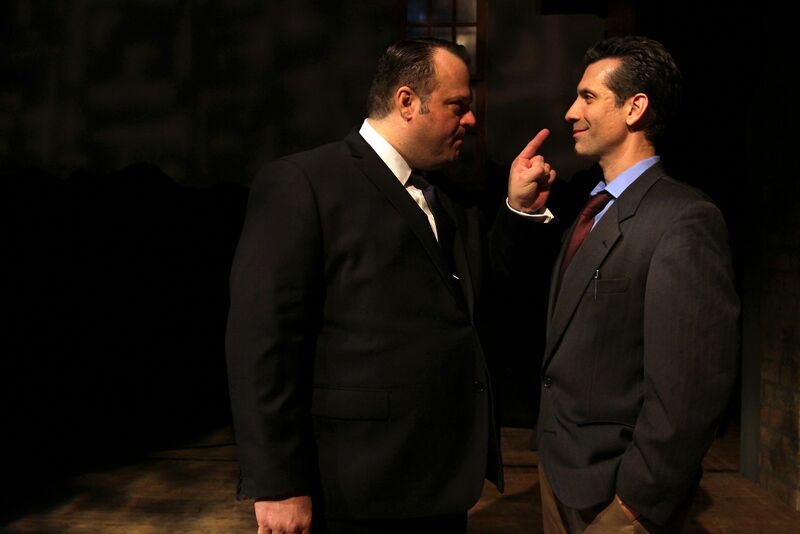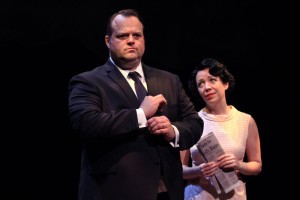
(Photo credit: Paola Nogueras)
It’s often said of Frank Rizzo, “You either loved him or hated him.” But whatever your feelings are about the controversial Philadelphia icon, you’ll love Theatre Exile’s compelling world-premiere bioplay by award-winning Philly favorite Bruce Graham. Exile’s first-ever commissioned work, the highly anticipated RIZZO is first rate. Based on Sal Paolantonio’s best-selling book Rizzo: The Last Big Man in Big City America (Camino Books, Inc., 1993), and incorporating material from interviews with the people who knew, supported, and challenged the outspoken and divisive figure, the new play approaches the subject with sardonic wit, honesty, and insight, revealing the motivations behind the man who shaped the city’s history and image until his death in 1991, and whose legacy continues to resonate to the present day.
Set during the period of Rizzo’s last bid for mayoral re-election, the story moves back and forth in time through a series of first-person testimonies, recollections, and anecdotes, combined with re-enactments of public and private scenes from his life as patrolman, Police Commissioner, Mayor, and radio-show host. Graham’s astute script exposes the inferiority Rizzo felt from being a high-school dropout, the effects of being called a “dago” and other ethnic epithets, and the lingering impact of a disapproving and denigrating father, all of which fueled his anger, shaped his attitudes, and forged his ambition to be a hardline politico in control of the police force and the city he loved.
But neither does the script, nor Joe Canuso’s penetrating direction, equivocate about Rizzo’s incendiary statements and bullying, which incited police brutality, racial tensions, and ongoing antipathy with the press, political opponents, and minority communities. You can’t make this stuff up, and you can’t ignore it, and Graham incorporates such infamous Rizzo quotes as “Get their black asses,” “Vote white,” and “I’m gonna make Attila the Hun look like a faggot,” giving the audience a clear indication of the uncensored beliefs, offensive speech, and unapologetic bigotry that made him revered by his constituents, reviled by his adversaries, and, by his own admission, “the Mayor of two cities—one black, one white.”

The ever-outstanding Scott Greer stars as the larger-than-life Rizzo, commanding the stage and delivering all the bluster, rage, and bravado, unwitting humor, and human complexity of his embattled character. Damon Bonetti is amusing and relentless as the objective reporter, who sees both the good and the bad in Rizzo, and who, despite being a constant thorn in his side, is still liked by the big man (mostly, we are led to believe, because he’s Italian!). They are supported by a terrific ensemble playing multiple roles on a largely dark and bare stage that is minimally suggestive of a Philadelphia row house (scenography by John Hoey), with spotlights giving focus to their deeply felt words and emotions.
Amanda Schoonover is soft and caring as Rizzo’s loving wife Carmella, then committed and determined as the no-nonsense child advocate Shelly Yanoff, who led a recall effort against the Mayor in 1976. Robert DaPonte, Akeem Davis, Paul L. Nolan, and William Rahill all turn in powerful portrayals of the colleagues, proponents, and antagonists of Rizzo, who relay their versions of his story and their views on his persona with appropriate passion and credibility. Videos of news clips from the era and black-and-white interviews with Greer as Rizzo add to the authenticity of the real-life theme, as do the well-researched costumes by Katherine Fritz and the clear sound by Michael Kiley.
[Christ Church Neighborhood House, 20 N. American Street] October 15-November 8, 2015; theatreexile.org.
